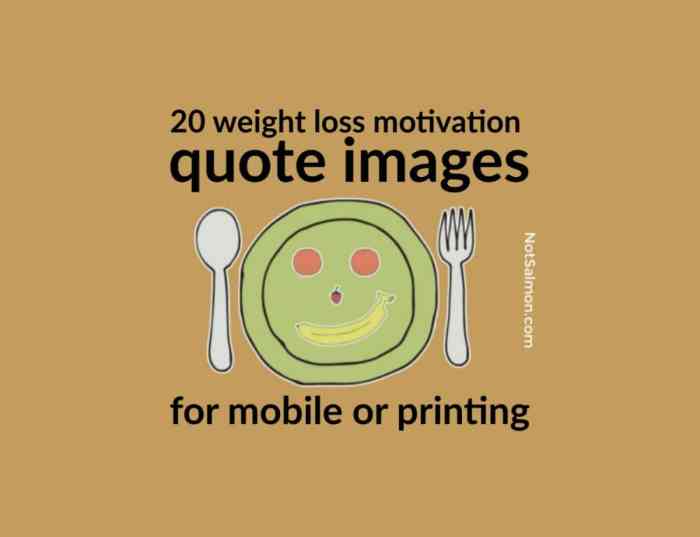Weight Loss Motivation sets the tone for a journey of self-discovery and empowerment, where inner strength meets external support to achieve transformative results. Get ready to dive into the world of motivation and wellness, where every step counts towards a healthier you.
Benefits of Weight Loss Motivation
When it comes to shedding those extra pounds, having the right motivation can make all the difference in your weight loss journey. It’s that inner fire that keeps you going when the going gets tough, pushing you to stay on track and reach your goals.
Impact of Motivation on Weight Loss Journey
Motivation serves as the driving force behind your actions and decisions when it comes to your weight loss journey. It helps you stay focused, committed, and disciplined, even when faced with challenges or setbacks. With a strong sense of motivation, you are more likely to stick to your healthy eating and exercise routines, leading to steady progress and results.
Motivation for Sustainable Results
Unlike quick-fix diets or temporary lifestyle changes, motivation plays a key role in helping you achieve long-lasting and sustainable results. By staying motivated, you are more likely to adopt healthy habits that become a natural part of your daily routine, leading to lasting weight loss and maintenance.
Improvement in Overall Well-Being
Beyond just the physical changes, staying motivated throughout your weight loss journey can have a positive impact on your overall well-being. Increased energy levels, improved mood, better sleep quality, and enhanced self-confidence are just a few of the many benefits that come from staying motivated and committed to your health goals.
Types of Weight Loss Motivation

When it comes to weight loss motivation, there are two main types: intrinsic and extrinsic motivation. Intrinsic motivation comes from within, driven by personal goals, values, and desires. On the other hand, extrinsic motivation is external, coming from outside sources like rewards, punishments, or social pressure.
Internal Factors Driving Weight Loss Motivation
Internal factors play a crucial role in motivating individuals to lose weight. Examples of internal factors include:
- Desire for better health and longevity
- Increased self-confidence and self-esteem
- Personal goals and values related to fitness and well-being
- Improved mental health and emotional well-being
External Factors to Stay Motivated in Weight Loss
External factors can also help individuals stay motivated on their weight loss journey. Some external factors include:
- Support from friends, family, or a weight loss group
- Access to professional guidance from a nutritionist or personal trainer
- Rewards or incentives for reaching weight loss milestones
- Positive reinforcement and encouragement from others
Strategies to Boost Weight Loss Motivation

To achieve successful weight loss, it is essential to maintain high levels of motivation throughout the journey. Here are some actionable steps to boost weight loss motivation:
Setting Specific, Achievable Goals
Setting specific and achievable goals is crucial for maintaining motivation. Instead of aiming to “lose weight,” set a goal to “lose 10 pounds in two months.” This way, you have a clear target to work towards.
- Set realistic goals based on your current weight, lifestyle, and capabilities.
- Break down larger goals into smaller, manageable milestones to track progress effectively.
- Celebrate each milestone achieved to stay motivated and focused on the end goal.
Staying Motivated During Plateaus or Setbacks
Plateaus and setbacks are common during weight loss journeys and can be demotivating. Here are some tips to stay motivated during challenging times:
- Remind yourself of your reasons for wanting to lose weight and visualize the end goal.
- Seek support from friends, family, or a support group to stay accountable and motivated.
- Try new workout routines or healthy recipes to break through plateaus and keep things interesting.
- Track your progress through measurements, photos, or journaling to see how far you’ve come.
Role of Community Support in Weight Loss Motivation
Community support plays a crucial role in enhancing weight loss motivation. Being part of a supportive community can provide encouragement, accountability, and a sense of belonging, which are all essential for staying motivated on the weight loss journey.
Benefits of Sharing Experiences and Progress with Others
Sharing experiences and progress with others in a supportive community can have numerous benefits. It allows individuals to celebrate their achievements, receive feedback, and learn from others’ successes and challenges. This sharing fosters a sense of camaraderie and motivates individuals to keep pushing towards their weight loss goals.
- Encouragement: Community members can provide words of encouragement and support during both the highs and lows of the weight loss journey.
- Accountability: Sharing progress with others holds individuals accountable for their actions and helps them stay on track with their goals.
- Motivation: Seeing others succeed or overcome obstacles can inspire individuals to stay committed and motivated towards their own weight loss journey.
Examples of Communities Fostering Weight Loss Motivation
There are various online and offline communities that are dedicated to fostering weight loss motivation. Some examples include:
- Online Forums: Platforms like Reddit’s r/loseit or MyFitnessPal’s community forums provide a space for individuals to share their experiences, seek advice, and motivate each other.
- Support Groups: Local support groups or weight loss challenges organized by fitness centers or community centers offer in-person support and accountability for individuals on their weight loss journey.
- Social Media Groups: Facebook groups or Instagram communities focused on weight loss and fitness serve as virtual support networks where members can share tips, progress photos, and motivational stories.
Tracking Progress and Celebrating Milestones
Tracking your weight loss progress is crucial for staying motivated and focused on your goals. It allows you to see how far you’ve come, identify patterns that work or need adjustment, and provides a sense of accomplishment as you reach each milestone.
The Significance of Tracking Weight Loss Progress
Tracking your weight loss progress helps you stay accountable and motivated. By monitoring your weight, measurements, and even food intake, you can make informed decisions about your health and fitness journey. It also allows you to celebrate small victories along the way, boosting your confidence and drive to keep going.
Celebrating Small Victories to Boost Motivation
- Set small, achievable goals to celebrate regularly, such as losing a pound or fitting into a smaller clothing size.
- Reward yourself with non-food treats like a new workout outfit, a spa day, or a fun activity you enjoy.
- Create a progress chart or vision board to visually see your accomplishments and remind yourself of how far you’ve come.
- Share your milestones with friends or online communities for extra support and encouragement.
Overcoming Common Obstacles to Weight Loss Motivation
To achieve successful weight loss, it’s important to address common obstacles that can hinder motivation along the way. By identifying these challenges and implementing effective strategies, individuals can stay on track and maintain their motivation levels throughout their journey.
Dealing with Cravings
Cravings for unhealthy foods can often derail weight loss efforts. To overcome this obstacle, it’s essential to stock up on nutritious snacks, plan meals in advance, and practice mindful eating. Additionally, staying hydrated and getting enough sleep can help reduce cravings and promote healthier food choices.
Managing Stress and Emotional Eating
Stress and emotions can lead to overeating and hinder weight loss progress. To combat this challenge, individuals can engage in stress-reducing activities such as exercise, meditation, or yoga. Seeking support from friends, family, or a therapist can also help manage emotions and prevent emotional eating episodes.
Finding Time for Exercise
One common obstacle to weight loss motivation is the lack of time for exercise. To overcome this challenge, individuals can incorporate short, high-intensity workouts into their routine, such as interval training or quick bodyweight exercises. Setting realistic exercise goals and finding activities that are enjoyable can also help maintain consistency in workout routines.
Dealing with Plateaus, Weight Loss Motivation
Plateaus in weight loss progress can be demotivating for individuals. To overcome this obstacle, it’s important to reassess dietary habits, increase physical activity, or try new types of exercises. Setting new goals, tracking progress, and celebrating small victories along the way can help individuals stay motivated during weight loss plateaus.
Handling Negative Self-Talk
Negative self-talk and self-doubt can hinder weight loss motivation. To combat this obstacle, individuals can practice positive affirmations, surround themselves with supportive friends and family, and seek guidance from a counselor or coach. Building self-confidence and focusing on progress rather than perfection can help maintain motivation levels throughout the weight loss journey.